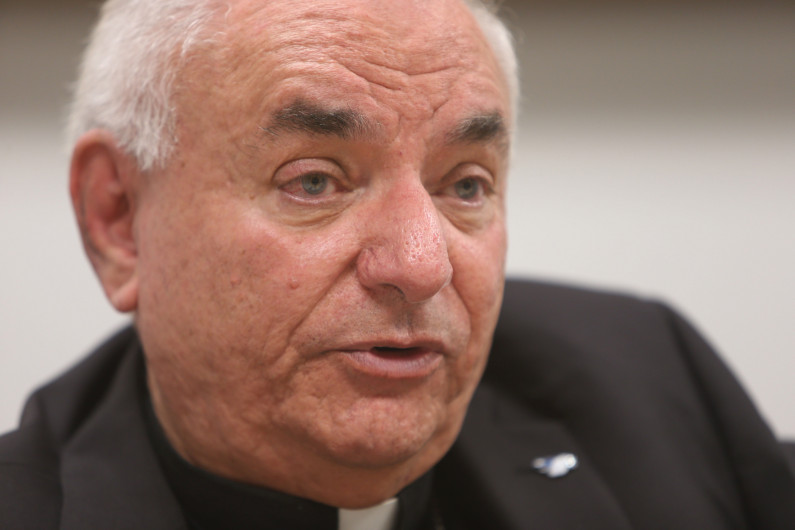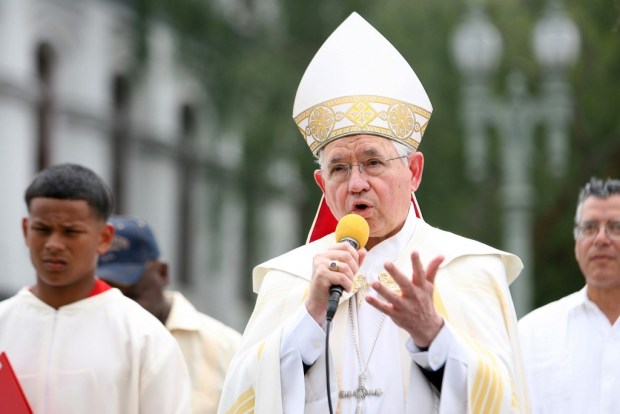New Mediation Program Would Allow Victims of Catholic Priest Sexual Abuse to Settle Claims outside Court
By Joe Nelson and Scott Schwebke
Six Catholic dioceses in California, including those in San Bernardino, Orange, and Los Angeles counties, have formed a compensation program for victims of clergy sexual abuse that allows them to settle claims privately, outside the courts, the California Catholic Conference announced Tuesday. The voluntary program will be available to any person who has been sexually abused as a minor by priests from the dioceses of San Bernardino, Orange, Los Angeles, Fresno, Sacramento and San Diego. As an alternative to litigation, victim-survivors can choose to meet with two mediators, in private and without an attorney if preferred, to potentially settle their claims. The mediators, Kenneth Feinberg and Camille Biros, will review the claims and determine who should be compensated and the amount offered. Settlements will occur within 90 days and be determined by the mediators, with no church interference, according to the California Catholic Conference, which is the public policy arm of the Catholic Church in the state. Feinberg and Biros are mediators for similar victim compensation programs involving Catholic dioceses in Pennsylvania, New York, New Jersey and Colorado. The two attorneys also have represented the families of victims of the 9/11 terrorist attacks and the 2010 Deepwater Horizon oil spill in the Gulf of Mexico, considered to be one of the largest petroleum spills ever.
Oversight board The Independent Compensation Program for Victims-Survivors of Sexual Abuse of Minors by Priests, or ICP, also will have an oversight board that will oversee the implementation and administration of the program. Among its members will be former Gov. Gray Davis and Maria Contreras-Sweet, former administrator of the U.S. Small Business Administration. Bishop Gerald Barnes of the Diocese of San Bernardino tweeted out a video-recorded statement Tuesday, saying, in part, that the compensation program “builds upon the many steps the Diocese of San Bernardino has taken in ministry to the victims since the clergy sexual abuse crisis came to light in 2002.” ‘Can’t erase the trauma’ “In the coming weeks, victim-survivors will be able to come forward and share their stories confidentially with an independent, third-party mediator and begin a process that can lead to their compensation,” Barnes said. “I know financial compensation can’t erase the trauma and lasting impacts of abuse. At the same time, several of my brother bishops of California and I have come to believe, after prayerful reflection, that this program can offer a measure of healing to victims.” Diocesan spokesman John Andrews said the diocese has paid out more than $25 million to victims of clergy sexual abuse. In the Diocese of Orange, The majority of abuse cases were settled in early 2005 for $100 million, spokeswoman Tracey B. Kincaid said. “Since then, due to an extensive culture change in the Diocese of Orange, accusations against priests said to have abused minors are very few,” she added. Survivors Network prefers ‘day in court’ In a statement Tuesday, the Survivors Network of those Abused by Priests, a nonprofit support group, said victims should carefully weigh their options before accepting compensation from the dioceses. “We believe that the best way to expose wrongdoing and enforce accountability is for crimes to be made public and for punishment and compensation to be meted out by courts, not the institutions that allowed the wrongdoing to happen in the first place” the statement says. “Survivors deserve a chance to have their day in court and shed light on their abuse, and that can only happen when statutes of limitations are reformed, civil windows are opened, and bishops are held accountable in courts of law.” Victims also should have a voice in hammering out details of the compensation program, according to SNAP. “If California’s bishops are serious about creating a compensation program that is to the best benefit of survivors, they should seek to meet with survivors who have had experience with litigation and compensation to help refine and improve this compensation program,” the statement says. Pennsylvania reignited scandal The Catholic Church sex abuse scandal was reignited last September, when a Pennsylvania grand jury reported more than 300 priests had molested at least 1,000 children over a 70-year period, and that there likely were thousands more victims. The 18-month investigation covered six of the state’s dioceses. That prompted dioceses across California, including San Bernardino, Orange, San Diego and Los Angeles, to publicly release the names of all priests accused of sexual abuse in the history of each diocese, or update their existing lists. The six dioceses began working with Feinberg and Biros on the ICP in the fall, after the findings from the Pennsylvania grand jury went public and shed the spotlight on a Catholic Church sex abuse scandal first exposed by the Boston Globe in 2002. In October, the Diocese of San Bernardino, which represents parishes and parishioners in Riverside County as well, released the names of 34 accused priests since the formation of the diocese in 1978. The Diocese has 92 parishes, with 1.7 million parishioners. ‘Sensitivity, compassion, privacy’ The Most Rev. Kevin Vann, bishop of the Diocese of Orange, said the diocese is participating in the compensation program to bring “healing and justice” to those who were abused. “Our goal is to help victims receive compensation for their pain and suffering in an environment where they are treated with sensitivity and compassion and their privacy is respected,” he said in a statement. In 2014, the Diocese of Orange, serving, about 1.6 million Catholics in 62 Orange County parishes, released a list of priests removed from the ministry amid credible allegations of sexual abuse. The list was last updated in March and includes 18 names. Archbishop Jose H. Gomez of the Archdiocese of Los Angeles said in a statement Tuesday that the six California dioceses will be reaching out to victims who have previously reported allegations of abuse and alert them of the new program, which is open to victim-survivors who can no longer seek redress in the courts because the statutes of limitations has lapsed. Additionally, victim-survivors who are undocumented immigrants are also eligible to make claims under the new program. Asked if the new program was designed to keep allegations of clergy sexual abuse out of the public arena, remove attorneys from the picture and potentially settle claims for less, John Andrews, a spokesman for the Diocese of San Bernardino, said: “This is offered as a way to help victim-survivors toward healing and an acknowledgement of our responsibility to make amends for our past failures to protect children.” “Part of the terms of this voluntary program is that the victim is free to make their allegation public, but that is their decision,” Andrews said. “We are not authorized to make the information public, under the terms of the program.” He said the diocese, since 2002, has been transparent about its history of clergy sexual abuse and setting things right with its victim-survivors. “And financial compensation is part of that,” he said, “but it certainly doesn’t undo the harms and damage done to someone by this.”
|
.
Any original material on these pages is copyright © BishopAccountability.org 2004. Reproduce freely with attribution.

